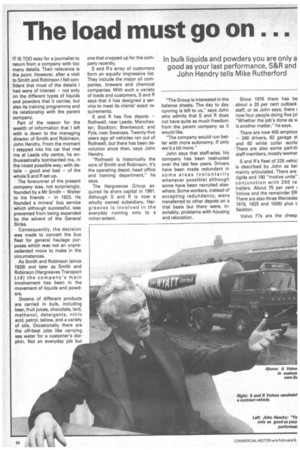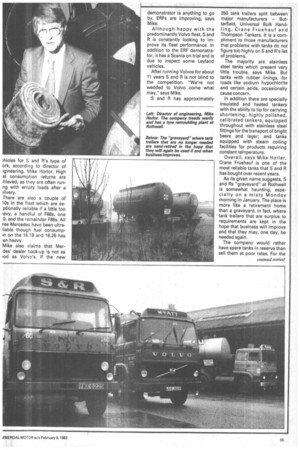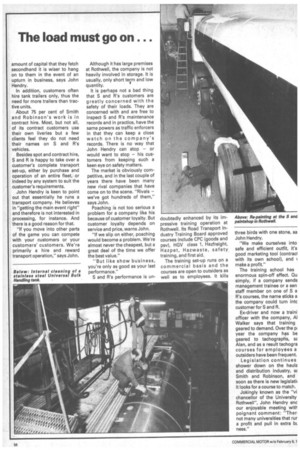The load must gó on . . .
Page 48

Page 49

Page 50

If you've noticed an error in this article please click here to report it so we can fix it.
In bulk liquids and powders you are only a good as your last performance, S&R and John Hendry tells Mike Rutherford
IT IS TOO easy for a journalist to return from a company with too many details. Their relevance is the point. However, after a visit to Smith and Robinson I felt confident that most of the details I had were of interest — not only on the different types of liquids and powders that it carries, but also its training programme and its relationship with the parent company.
Part of the reason for the wealth of information that I left with is down to the managing director of Smith and Robinson, John Hendry. From the moment I stepped into his car that met me at Leeds city centre, he enthusiastically bombarded me, in the nicest possible way, with details — good and bad — of the whole S and R set-up.
The forerunner of the present company was, not surprisingly, founded by a Mr Smith — Walter to his friends — in 1923. He founded a miners' bus service which although successful, was prevented from being expanded by the advent of the General Strike.
Consequently, the decision was made to convert the bus fleet for general haulage purposes which was not an unprecedented move to make in the circumstances.
As Smith and Robinson (since 1929) and later as Smith and Robinson (Hargreaves Transport Ltd) the company's main involvement has been in the movement of liquids and powders. one that cropped up for the company recently.
S and R's array of customers form an equally impressive list. They include the major oil companies, brewers and chemical companies. With such a variety of loads and customers, S and R says that it has designed a service to meet its clients' exact requirements.
S and R has five depots — Rothwell, near Leeds; Manchester; Stockton; Brentwood; and Pyle, near Swansea. Twenty-five years ago all vehicles ran out of Rothwell, but there has been devolution since then, says John Hendry.
"Rothwell is historically the core of Smith and Robinson. It's the operating depot, head office and training department," he says.
The Hargreaves Group acquired its share capital in 1961. Although S and R is now a wholly owned subsidiary, Hargreaves is involved in the everyday running only to a minor extent. "The Group is interested in the balance sheets. The day to day running is left to us," says John who admits that S and R does not have quite as much freedom from the parent company as it would like.
"The company would run better with more autonomy. If only we'd a bit more."
John says that staff-wise, his company has been restructed over the last few years. Drivers have been made redundant in some areas (voluntarily whenever possible) although some have been recruited elsewhere. Some workers, instead of accepting redundancy, were transferred to other depots on a trial basis but there were, inevitably, problems with housing and relocation. Since 1976 there has be about a 20 per cent cutback staff, or as John says, there now four people doing five jol "Whether the job's done as NA is another matter," he says.
There are now 400 employE — 240 drivers, 62 garage st and 60 white collar workE There are also some part-tii staff members, mostly womer S and R's fleet of 225 vehicl is described by John as bei mainly articulated. There are rigids and 190 "motive units" conjunction with 250 ta trailers. About 75 per cent Volvos and the remainder ER There are also three Mercedes 1619, 1625 and 1626) plus c Seddon.
Volvo F7s are the cheap )hicles for S and R's type of ork, according to director of igineering, Mike Honor. High el consumption returns are :hieved, as they are often runng with empty loads after a :livery.
There are also a couple of lOs in the fleet which are exptionally reliable if a little too iavy, a handful of F88s, one 0, and the remainder F86s. All ree Mercedes have been ultraliable though fuel consumpin on the 16.19 and 16.26 has !en heavy.
Mike also claims that Mendes' dealer back-up is not as rod as Volvo's. If the new demonstrator is anything to go by, ERFs are improving, says Mike.
Although happy with the predominantly Volvo fleet, S and R is constantly looking to improve its fleet performance. In addition to the ERF demonstrator, it has a Scania on trial and is due to inspect some Leyland vehicles.
After running Volvos for about 11 years S and R is not blind to the competition. "We're not wedded to Volvo come what may," says Mike.
S and R has approximately 250 tank trailers split between major manufacturers — Butterfield, Universal Bulk Handling, Crane Fruehauf and Thompson Tankers. It is a compliment to those manufacturers that problems with tanks do not figure too highly on S and R's list of problems.
The majority are stainless steel tanks which present very little trouble, says Mike. But tanks with rubber linings, for loads like sodium hypochlorite and certain acids, occasionally cause concern.
In addition there are specially insulated and heated tankers with the ability to tip for carrying shortening; highly polished, calibrated tankers, equipped throughout with stainless steel fittings for the transport of bright beers and lager; and tanks equipped with steam coiling facilities for products requiring constant temperature.
Overall, says Mike Horler, Crane Fruehauf is one of the most reliable tanks that S and R has bought over recent years.
As its given name suggests, S and Rs "graveyard" at Rothwell is somewhat haunting, especially on a misty Monday morning in January. The place is more like a retirement home than a graveyard, in fact, where tank trailers that are surplus to requirements are kept in the hope that business will improve and that they may, one day, be needed again.
The company would rather have spare tanks in reserve than sell them at poor rates. For the amount of capital that they fetch secondhand it is wiser to hang on to them in the event of an upturn in business, says John Hendry.
In addition, customers often hire tank trailers only, thus the need for more trailers than tractive units.
About 75 per cent of Smith and Robinson's work is in contract hire. Most, but not all, of its contract customers use their own liveries but a few clients feel they do not need their names on S and R's vehicles.
Besides spot and contract hire, S and R is happy to take over a customer's complete transport set-up, either by purchase and operation of an entire fleet, or indeed by any system to suit the customer's requirements.
John Hendry is keen to point out that essentially he runs a transport company. He believes in "getting the main event right" and therefore is not interested in processing, for instance. And there is a good reason for that.
"If you move into other parts of the game you can compete With your customers or your customers' customers. We're primarily a hire and reward transport operation," says John. Although it has large premises at Rothwell, the company is not heavily involved in storage. It is usually, only short ter and low quantity.
It is perhaps not a bad thing that S and R's customers are greatly concerned with the safety of their loads. They are concerned with and are free to inspect S and R's maintenance records and in practice, have the same powers as traffic enforcers in that they can keep a close watch on the company's records. There is no way that John Hendry can stop — or would want to stop — his customers from keeping such a keen eye on safety matters.
The market is obviously competitive, and in the last couple of years there have been many new rival companies that have come on to the scene. "Rivals — we've got hundreds of them," says John.
Poaching is not too serious a problem for a company like his because of customer loyalty. But customer loyalty depends on service and price, warns John.
"If we slip on either, poaching would become a problem. We're almost never the cheapest, but a great deal of the time we offer the best value."
"But like show business, you're only as good as your last performance."
S and R's performance is un doubtedly enhanced by its impressive training operation at Rothwell. Its Road Transport Industry Training Board approved courses include CPC {goods and psv), HGV class 1, Hazfreight, Hazpet, Hazwaste, safety training, and first aid.
The training set-up runs on a commercial basis and the courses are open to outsiders as well as to employees. It kills three birds with one stone, sa John Hendry.
"We make ourselves into safe and efficient outfit, it's good marketing tool (contrad with its own school), and make a profit."
The training school has enormous spin-off effect. Qu simply, if a company sends management trainee or a sen staff member on one of S a R's courses, the name sticks a the company could turn intc customer for S and R.
Ex-driver and now a traini officer with the company, Al Walker says that training geared to demand. Over the p. year the company has be geared to tachographs, sz Alan, and as a result tachogra courses for employees a outsiders have been frequent.
Legislation continues shower down on the haula and distribution industry, SE Smith and Robinson, and soon as there is new legislati■ it looks for a course to match.
Jokingly known as the "vi chancellor of the University Rothwell", John Hendry enc our enjoyable meeting with poignant comment: "Thep not many universities that rur a profit and pull in extra bi ness."


































































